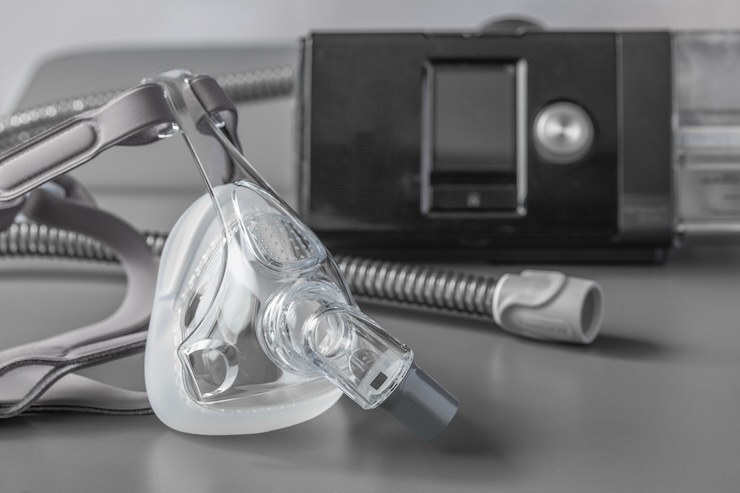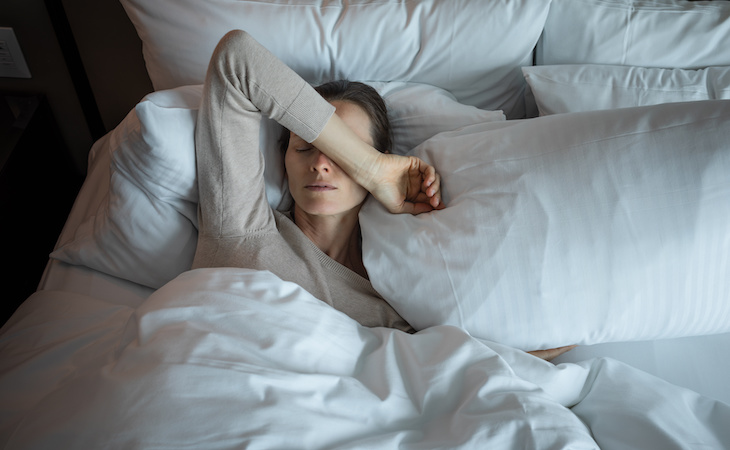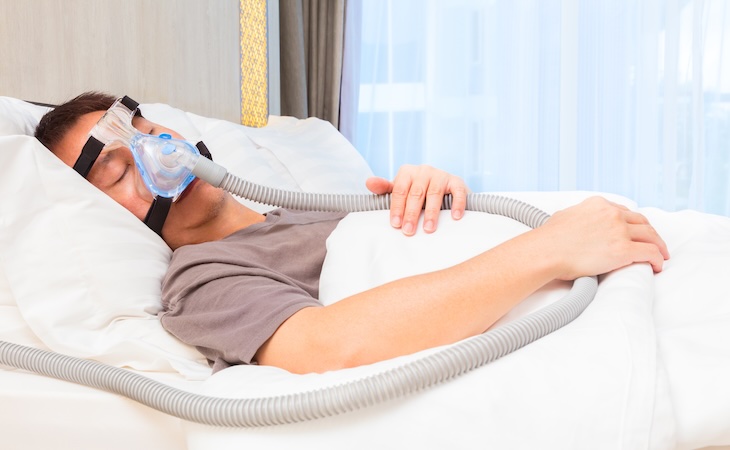You know sleep is good for the brain, but a new study published in the Journal of Clinical Sleep Medicine, the official publication of the American Academy of Sleep Medicine, finds a link between sleep and the neurodegenerative brain disease Alzheimer’s.
Specifically, a lack of deep slow wave sleep and rapid eye movement (REM) sleep was linked with a buildup of beta-amyloid plaques—brain proteins that are key markers of Alzheimer’s.
More research is needed to fully understand the link between sleep and Alzheimer’s, but this study adds to a growing body of literature connecting Alzheimer’s and sleep.
It also suggests that sleep itself—including issues like sleep apnea—could be a critical determining factor for the development of dementia, a group of symptoms including memory loss, confusion, and poor judgment. (Alzheimer’s disease is the most common cause of dementia.)
A new study finds that a lack of deep sleep and REM sleep is linked to a buildup of beta-amyloid plaques—brain proteins that are key markers of Alzheimer’s.
“Getting enough quality, restful sleep isn’t just about feeling refreshed; it could help protect your brain from long-term damage,” says Raj Dasgupta, MD, chief medical advisor for Sleepopolis.
About 6.7 million Americans 65 and older live with Alzheimer’s disease, a figure that’s projected to double by 2060, barring medical breakthroughs to prevent or cure the condition. Fortunately, sleep is one factor you can take control of right now.
Below, a look at what to know about sleep, dementia, Alzheimer’s, sleep apnea, and more—and how to protect your rest and, in turn, your brain.

The importance of sleep for brain health
Your brain is impressively active while you’re sleeping; in fact, sleep is an essential aspect of maintaining brain health.
Licensed psychologist and author of the forthcoming book Sleep Advantage Leah Kaylor, PhD, says sleep supports memory consolidation, promotes overall cognitive functioning, and clears metabolic waste, including beta-amyloid.
Without sleep, your brain can’t form or maintain the pathways required for learning and creating new memories. A lack of sleep also makes it harder to concentrate and respond quickly.
Sleep deprivation negatively impacts your ability to process emotions and is linked with mental health conditions such as anxiety and depression.
Sleep’s most important role, however, might be the “housekeeping” work it does in the brain.

The relationship between Alzheimer’s and sleep
First, let’s talk about the recent findings: The new Journal of Clinical Sleep Medicine study examined the sleep architecture—specifically patterns of deep (slow wave) and REM sleep—of 270 people and assessed their brain volume 13 to 17 years later.
Researchers found that spending less time in deep and REM sleep was associated with reduced volume in Alzheimer’s-vulnerable brain regions, particularly the inferior parietal cortex, among the first areas affected by the disease.
“These results are particularly significant because they help characterize how sleep deficiency, a prevalent disturbance among middle-aged and older adults, may relate to Alzheimer’s disease pathogenesis and cognitive impairment,” said lead author Gawon Cho, PhD, in a press release.
“This reinforces the idea that suboptimal sleep is causally related to the development of dementia,” adds Hamid Djalilian, MD, a professor of otolaryngology, neurosurgery, and biomedical engineering at the University of California, Irvine, who wasn’t involved in the research. “Your sleep now could affect the structure of your brain 15 years in the future.”
Chronic sleep deprivation is linked with a 33% increase in dementia risk, according to Johns Hopkins University. Says Djalilian: “We’re beginning to realize that optimizing sleep, especially early in life, may be one of the most effective ways to reduce long-term neurodegenerative risk.”
But how exactly might sleep—or the lack of it—influence Alzheimer’s risk? That’s the topic of plenty of neuroscience research lately. Some imaging studies (like this most recent one) suggest chronic poor sleep is linked with shrinkage in key brain regions.
Another theory centers on the glymphatic system, a waste clearance system for the brain. During deep, slow-wave sleep, the brain shrinks slightly to allow cerebrospinal fluid to flow more freely, explains Kaylor.
“We’re beginning to realize that optimizing sleep, especially early in life, may be one of the most effective ways to reduce long-term neurodegenerative risk.” – Hamid Djalilian, MD, a professor of otolaryngology, neurosurgery, and biomedical engineering at the University of California, Irvine
“This fluid acts like a car wash,” Kaylor says, clearing out toxins such as beta-amyloids, tau proteins, and other substances linked to neurodegenerative diseases. “It’s like the brain’s nightly trash pickup—if it doesn’t happen, that waste starts to build up.”
Dysfunction of this system could contribute to dementia, the progression of Alzheimer’s disease, and potentially the risk of Alzheimer’s.

Sleep apnea and Alzheimer’s disease
In addition to links between sleep and Alzheimer’s, there’s a well-established link between untreated (keyword) obstructive sleep apnea and an increased risk of Alzheimer’s disease.
While the full mechanisms are not fully understood, Dasgupta explains that obstructive sleep apnea can repeatedly deprive your brain of oxygen during sleep. “Low oxygen levels and poor quality sleep due to the apneas have been implicated in cognitive decline,” he says.

How to improve your sleep and lower your risk of Alzheimer’s disease
While more research is needed to fully understand the link between sleep and Alzheimer’s, there’s plenty you can do to safeguard your sleep—and, in turn, your brain health. Experts prescribe these four strategies to patients daily:
1. Treat any underlying sleep disorders
“If you snore, gasp, or wake often, screen for sleep apnea—it’s a silent contributor to neurodegeneration,” says Djalilian.
If you think you might have a sleep disorder, talk to your healthcare provider and seek the support of a specialist; doing so could go a long way for your brain health.
“In some cases, treating sleep apnea may help restore the brain’s natural waste-clearing function and lower dementia risk,” says Djalilian.
2. Be consistent
One hard and fast rule sleep professionals stick to is maintaining a regular sleep schedule—waking up and going to sleep at the same time every day; it’s one of the best things you can do for your sleep, says Dasgupta. It’ll help your brain anticipate sleep, making sleep healthier overall.
Consistency extends to a bedtime routine too. “Winding down is essential to signal to the body that it’s time to rest, fostering restful sleep and supporting overall well-being,” says Kaylor.
Try cutting out electronic devices at least an hour before bedtime, skipping alcohol or caffeine, practicing short gratitude, or deep breathing for relaxation. Making your sleeping environment a dark, cool, calming environment is also key.
“In some cases, treating sleep apnea may help restore the brain’s natural waste-clearing function and lower dementia risk.” – Hamid Djalilian, MD
3. Engage in “circadian therapy”
One of the best ways to keep your circadian rhythm on track is to get 30 minutes or so of natural sunlight in the morning and avoid blue light (screens) in the evening.
Appropriately timed lightness and darkness help signal to the brain when it’s time to be alert and awake and when it’s time to wind down and sleep.
4. Set yourself up for better sleep during the day
What you do during the day has a big impact on how well you sleep at night. Regular exercise and a balanced, nutrient-rich diet are key factors in boosting sleep quality and duration, says Dasgupta.
Timing matters: Steer clear of intense workouts in the few hours before bed and skip heavy meals or sugary snacks late at night—both can mess with your rest.
Djalilian adds that anti-inflammatory diets and omega-3 supplements may support your brain’s glymphatic system (that built-in “car wash”) and help guard against cognitive decline.
FAQs
How does Alzheimer’s affect sleep?
Alzheimer’s can disrupt the body’s internal clock, leading to trouble falling asleep, frequent wake-ups, and confusion about time—especially in the evening, a pattern known as sundowning, says Dasgupta. The relationship goes both ways, adds Djalilian: “Poor sleep can speed up Alzheimer’s progression, and Alzheimer’s further disrupts sleep. Addressing sleep early may help break this cycle.”
Sleep is an essential function for your health. Next, learn all about the benefits of sleep for your physical and mental well-being.




